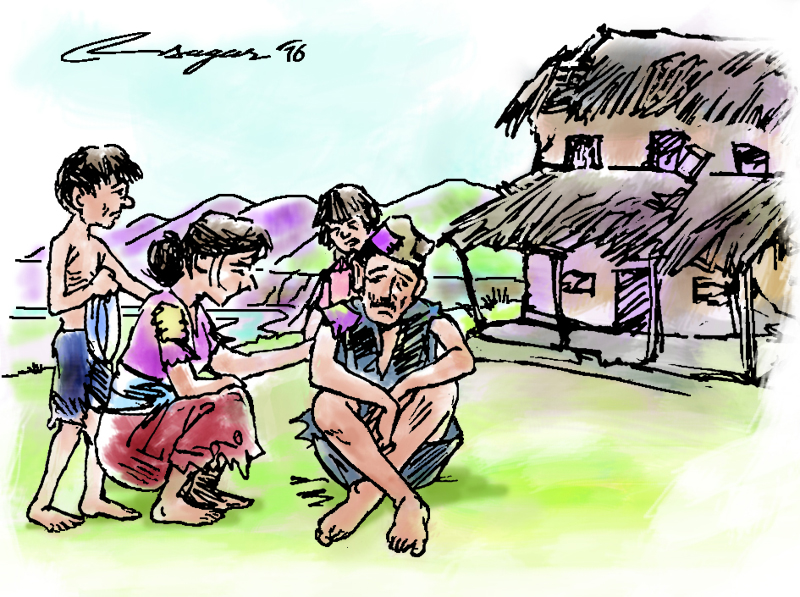Development dilemma: Karnali lags behind
The people of Karnali look forward to working hand in hand with political and civic leaders who wish to deliver social justice and honour
Out of the 14 administrative zones of Nepal, Karnali is the largest with an area of 21,351 square kilometer.
Karnali zone has five districts, namely Dolpa, Humla, Jumla, Kalikot and Mugu. In total there are 134 Village Development Committees (VDCs) in these five districts but no Municipality.
Karnali region is mainly inhabited by Chhetris, Thakuris, Brahmins, Lamas and Dalits. The 2001 Census registered a total population of 309,084 people (152,100 female and 156,984 male) in Karnali zone.
The average literacy rate of the Karnali zone is 21.76%. Only 6.37% female and 36.89% male are literate. The only motor road to touch Karnali Zone, Surkhet-Jumla sector of the Karnali highway, is still under construction.
This road is going to be a lifeline for Karnali as it will link Karnali Zone to other parts of Nepal and open up the possibilities for economic activities. However, little has been done to complete the road.
There are air services to the headquarters of Dolpa, Humla, Jumla and Mugu districts. Kalikot has irregular cargo helicopter service.
The Karnali zone lags far behind other zones of Nepal in terms of physical and human development. Different comparative indicators and indexes of development published in reports and documents are the evidence.
Human Development Index of Karnali region, for instance, is much lower than the national average. Politicians, policy makers, governmental and non-governmental representatives agree that special attention and schemes are necessary to bring Karnali in the national mainstream.
The worsening of Karnali has a history of 240 years. Since then, people of Karnali have been deprived of freedom and equal opportunities.
The dreams Karnali people had - of a good life, of dignity, of comfort and of security - have become nightmares. Karnali people are living in a state of fear and uncertainty. They suffer discrimination in all forms and are unable to earn a living.
The level of poverty is high. Non-existent service delivery also makes life of Karnali difficult. Access to education, housing and other basic needs is limited to rich people. Poverty is rampant forcing thousands of people to migrate elsewhere.
This process of migration creates social disaster paralleled with a failed economic system. Day-by-day people of this region are going abroad, creating a loss of human resource.
The government is not accountable to its people. Corruption at all levels of government and the politicization of all aspects of society has led to chaos and disorganization in every sector.
Karnali is mostly dependent on outside assistance to feed its people, to provide a minimum level of social services and to guarantee even modest economic activities. Karnali districts have minimum internal revenue.
The economy of Karnali was somehow balanced before the eighties. After 30 years, the economy of Karnali is totally dependent on outside and unbalanced. The workforce is uneducated and unskilled. Infrastructure is under developed.
Economic policies are problematic, so that there is less food as well as financial deficits.
During my 12 years of stay in Karnali, I have identified two major factors that I want to summarize as the following:
Major influencing factors comprise acute and chronic poverty, severe gender inequality and other human rights violations including abuse and exploitation of children especially the girls, high rates of child and maternal mortality, severe malnutrition and chronically stagnant or declining economic performance, food insecurity etc.
Catalyzing factors comprise unwillingness, incapacity, political instability and unsustainable development. Some of these catalyzing factors are easier to identify than others.
Some of those factors which can be identified can be known from statistical data while others can be understood from qualitative reports and local networks. These help to determine trends in social behaviour and relationships.
Yet other catalyzing factors like trafficking, natural resource exploitation, and diseases may be completely specific to a particular context.
Understanding and harnessing our collective capacities, instruments and interests will enable people of Karnali to work more collaboratively across government and with civil society.
It will lead to strengthening expertise within Karnali. The time has come to put the past behind us and start building the Karnali better tomorrow.
The people of Karnali want to be freed from intimidation from political parties. They want to feel like citizens of an independent and autonomous region of the country.
The people of Karnali want to be educated about the rights and freedoms guaranteed to them by the constitution. Also, they hope to enjoy their rights ascertained.
They want to be encouraged to take up leadership positions to ensure gender balance. They want to be ready to work together with strength, courage and hope, until all the people of Karnali live in harmony and with self-respect.
They want the leaders to be caring and responsible towards the people. They want their leaders to stay in the communities they serve, rather than in the capital.
They believe that their leaders should respect all people equally, listen to their concerns and consult them while making decisions. They desire feedback from their leaders.
They suppose that their leaders should publicly reject corruption and nepotism.
The people of Karnali look forward to working hand in hand with political and civic leaders who wish to deliver social justice and honour.






